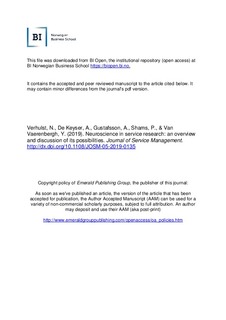Neuroscience in service research: an overview and discussion of its possibilities
Journal article, Peer reviewed
Accepted version
Permanent lenke
http://hdl.handle.net/11250/2630596Utgivelsesdato
2020Metadata
Vis full innførselSamlinger
- Publikasjoner fra CRIStin - BI [1015]
- Scientific articles [2181]
Originalversjon
Journal of Service Management. 2019, 30 (5), 621-649 10.1108/JOSM-05-2019-0135/full/htmlSammendrag
Purpose:
The purpose of this paper is to discuss recent developments in neuroscientific methods and demonstrate its potential for the service field. This work is a call to action for more service researchers to adopt promising and increasingly accessible neuro-tools that allow the service field to benefit from neuroscience theories and insights.
Design/methodology/approach:
The paper synthesizes key literature from a variety of domains (e.g. neuroscience, consumer neuroscience and organizational neuroscience) to provide an in-depth background to start applying neuro-tools. Specifically, this paper outlines the most important neuro-tools today and discusses their theoretical and empirical value.
Findings:
To date, the use of neuro-tools in the service field is limited. This is surprising given the great potential they hold to advance service research. To stimulate the use of neuro-tools in the service area, the authors provide a roadmap to enable neuroscientific service studies and conclude with a discussion on promising areas (e.g. service experience and servicescape) ripe for neuroscientific input.
Originality/value:
The paper offers service researchers a starting point to understand the potential benefits of adopting the neuroscientific method and shows their complementarity with traditional service research methods like surveys, experiments and qualitative research. In addition, this paper may also help reviewers and editors to better assess the quality of neuro-studies in service.
